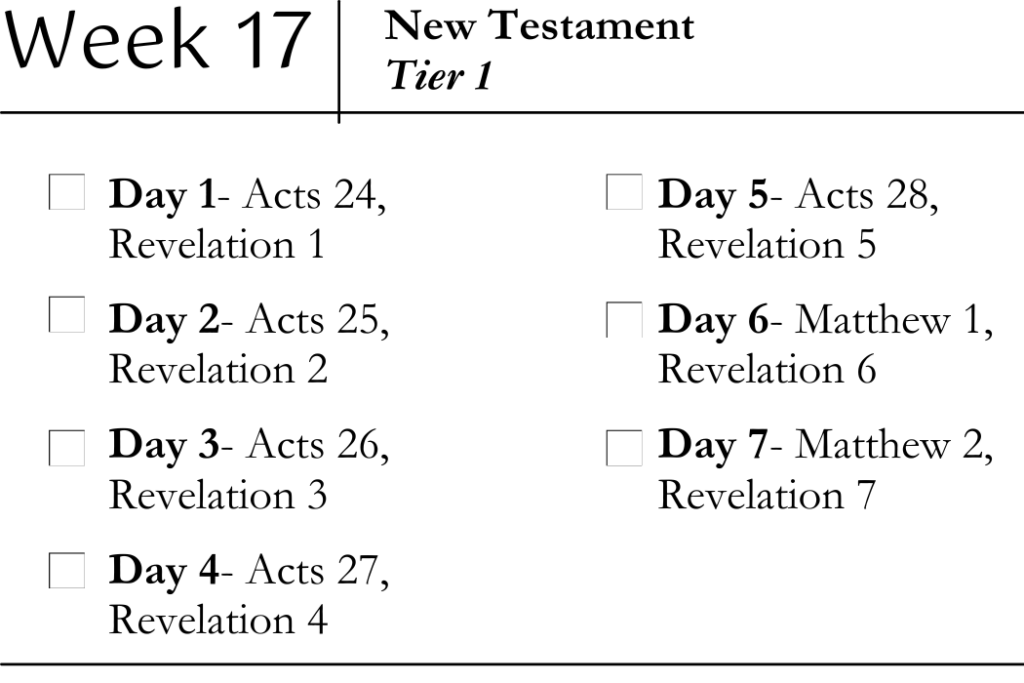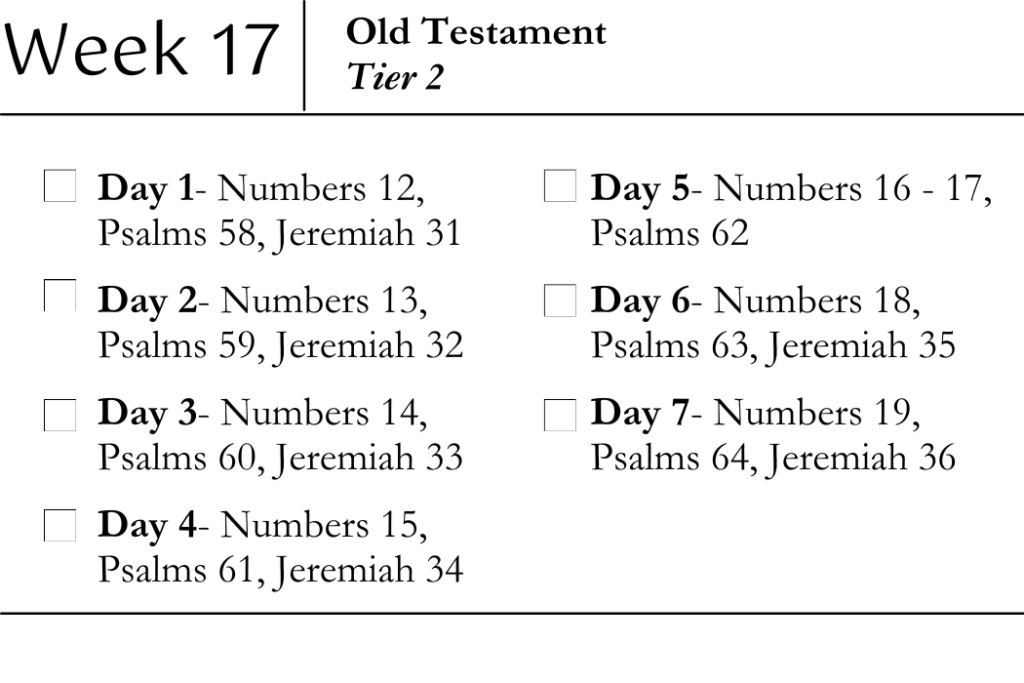When we continue in Jesus’ words, then we know the truth and are made free.
This week, we will finish Acts and begin again in Matthew (TIER 1 – Round 2). Today we start Revelation. In Numbers, we will witness the rebellion of Israel against the Lord’s command to go in and possess the Promised Land, and from there the rebellion of Korah will transpire. It will take 40 years to undo Egypt from Israel, unbelief is stubborn.
Psalms 58 through 64 are Psalms of David when he cried for help in various situations throughout life. Jeremiah begins with God’s expansive promises of redemption. Jeremiah learns that God speaks and acts and during His actions, He speaks over them His next move.
We move from believers in Jesus to disciples of Jesus when we abide in His word. As we abide, we know the truth and the truth makes us free. Freedom is Jesus; for it was for freedom that Christ made us free. We honor God when we abide in His word, and He blesses us with His freedom. It is not information but encounters with Jesus that we seek, and they are here in His word
WATCH That I May Know Him Week 17 PODCAST

GOSPELS / ACTS
Matthew 1 – 2
We begin the gospel with the genealogy of Jesus. See if you can find the five women mentioned in Jesus’ genealogy. Joseph is persuaded to take Mary as his wife. After Jesus’ birth, wise men from the East come, worship Him, and leave. Soon after, Joseph is instructed in a dream to take the young child and his mother to Egypt.
Acts 24 – 28
Paul has been brought to Caesarea. Five days later, Ananias, the high priest, along with elders and an orator named Tertullus, demand that Paul be judged. Paul says, “I came to bring alms to my nation.” The dispute is about the resurrection of the dead. For two years Paul will live in Caesarea until Porcius Festus succeeds Felix. Festus soon learns that the Jews want Paul to come to Jerusalem. He has them come down to Caesarea instead. The council plans to have Paul return to Jerusalem and kill him in an ambush along the way. Paul appeals to Caesar.
In Chapter 26, Paul shares his testimony and ministry calling. To know Paul better read Acts 9—his conversion, Acts 22—his testimony, and Acts 26—his ministry calling, which all come from the salvation he experienced with Jesus, on the way to Damascus. Paul is then sent by boat to Rome and warns everyone of the doom that is in store, but they won’t listen. The storm comes and Paul prays everyone to safety. Paul arrives in Rome and on an appointed day shares with all about the kingdom of God and Jesus.
REVELATION
Revelation 1 – 7
The glorious revelation of Jesus Christ begins with John, exiled on the island of Patmos for the word of God and the testimony of Jesus. Jesus shows up in a vision and gives John seven messages for the seven churches.
In Chapters 4 and 5, John is called up into the throne room and beholds God on the throne. The Lamb is the only one who is able to open the scrolls.
In Chapter 6 He (the Lamb) opens the six seals leading to Chapter 7 where we see the tribes of Israel sealed and then heavenly worship before the throne with his saints abiding, Jesus providing, and God wiping away every tear from their eyes.

TORAH
Numbers 12 – 19
Numbers 12 begins with the jealousy of Miriam and Aaron concerning Moses, finding fault with his Ethiopian wife. God will not stand for it. Moses is exalted, Miriam is left leprous, and the whole nation must wait for Miriam’s cleansing. Next, Moses is instructed to send 12 spies (one for each tribe) to spy out the land. It is a good land, flowing with milk and honey, but there are giants in the land. Ten spies see only the giants and see Israel as grasshoppers, but Caleb and Joshua see the giants as lunch. The 10 tribes prevail with their bad report and Israel collapses in despair and complains against Moses and Aaron. God is going to destroy Israel, but Moses intercedes. God says for every day, shall be a year, and that the children they feared would die will now bring Israel into the Promised Land. In the next chapter, God speaks immediately about when they come into the land, even though it is 40 years away.
In Chapters 16 and 17, there is greater jealousy and rebellion against Moses and Aaron. First, the rebellion of Korah (Levites who wanted Aaron and Moses’ position), and then the entire nation refuses Moses after God judges the Korah rebellion. Chapters 18 and 19 are more instructions, as God is slowly transforming a nation of slaves into sons.
POETRY
Psalm 58 – 64
These Psalms of David are David’s calling and trusting in the Lord in times of conflict. As glorious Psalms of trust, they bring us courage as we see David facing real situations and moving from the problem into the promises of God and His faithfulness.
PROPHETS
Jeremiah 31 – 36
In these chapters, we will witness God’s new covenant promised, and Israel gloriously coming back into the land. But Jeremiah is in prison in the 10th year of Zedekiah. God tells Jeremiah to redeem the property and seal the deed for days ahead. Jeremiah does so and prophesies the future restoration of Jerusalem. While Nebuchadnezzar sits outside the wall of Jerusalem is besieged. Jeremiah points out the obvious in the equation and God says, in effect, “So what, I am able to speak on top of judgment the healing of the land forthcoming.”
Jeremiah 33 is an explosion of this dual prophetic word, one being fulfilled, and another set already in motion to save. God is good!
Jeremiah 34 is the heartbreaking story of the leaders of Jerusalem setting their Hebrew slaves free and then changing their minds, and God declaring that they missed another chance to be saved from Nebuchadnezzar. Read this one slowly. In Chapter 35, God points out a family in obedience amid the apostasy of a nation and the forthcoming promise for their obedience.
Chapter 36 is a throwback to the time when the Lord had Jeremiah write on a scroll—during the reign of Jehoiakim son of Josiah—all the adversities God planned to bring on Judah. He is hoping this will persuade Judah to repent. Judah does respond with fasting and the fear of God. But when the scroll is brought to the king, he takes the scroll and throws it into the fire. God’s longsuffering continues and He tells Jeremiah to have Baruch the scribe pen another scroll. “God is longsuffering toward us, not willing that any should perish but all should come to repentance” (2 Peter 3:9).

